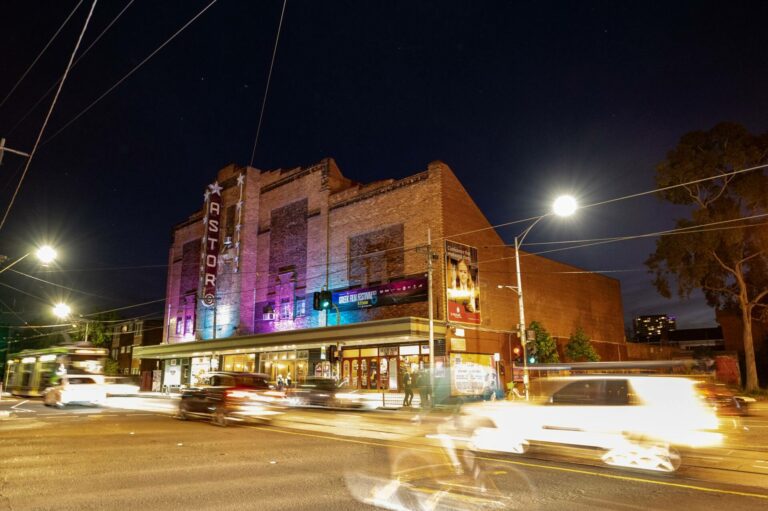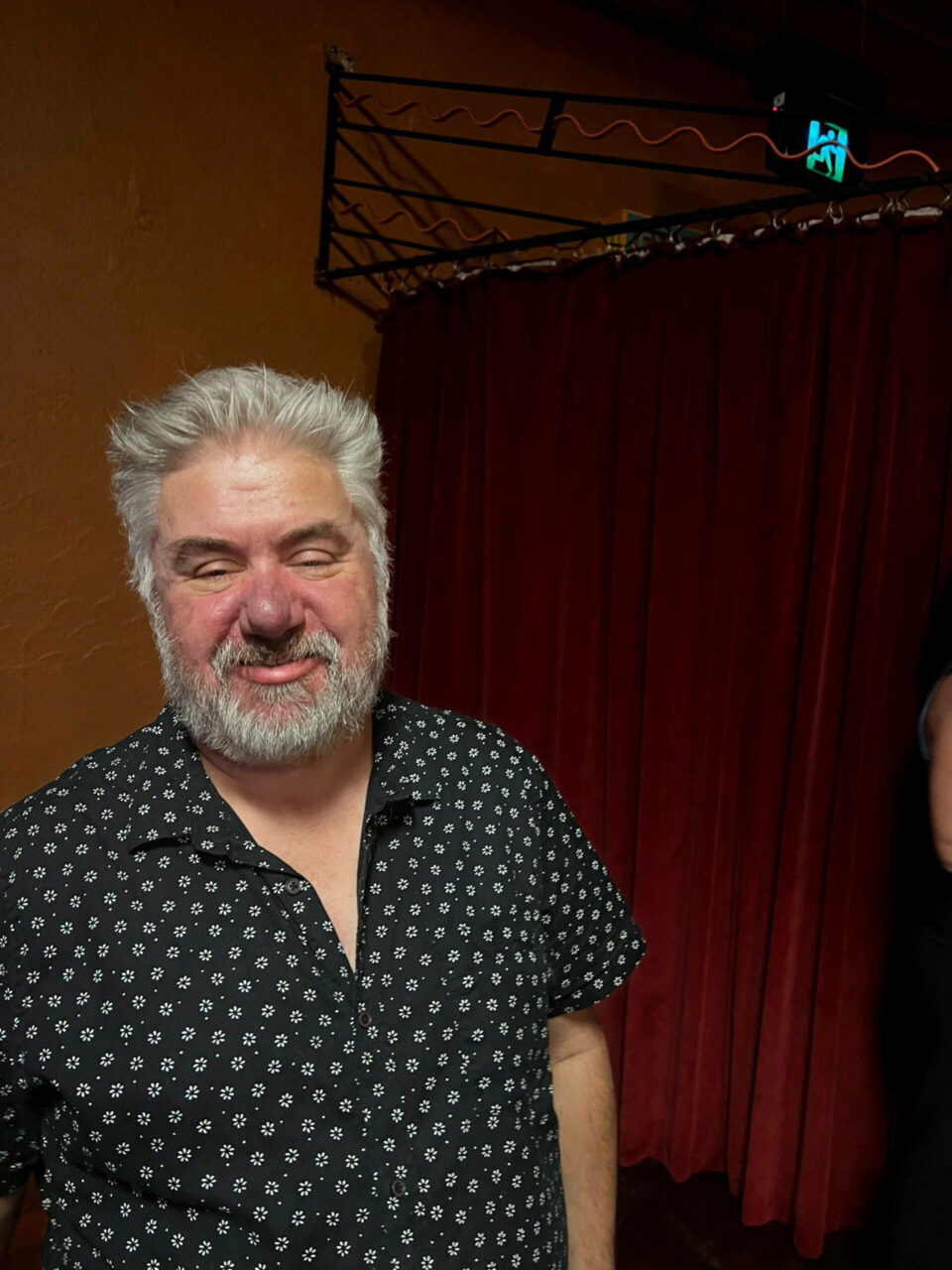Cinephiles, the Greek community and business leaders, families, young and old, gathered at the Astor Theatre, Palace Cinema Como and Balwyn Cinema for the opening of the 2023 Greek Film Festival (GFF) on Thursday night.
Asimina Proedrou’s multi-award-winning unsettling realist, Behind the Haystacks, follows the story of a Greek family’s ethical collapse in 2015 as they try to survive the Greek financial crisis by becoming accomplices in human trafficking while thousands of displaced Syrians try to cross over into Greece from its Balkan north.
Neos Kosmos talked to cinemagoers milling around the Deco foyer of the Astor before the screening.

Cinemagoers seek connection
Nikos Papastergiadis, professor in the School of Culture and Communication at the University of Melbourne, said the GFF “provides a window into contemporary Greek culture.”
“Cinema is a window that gives us a combination of eccentric and reflective views– it engages with the desires and passions, active in Greece now, and it opens a portal for connections between us and them.”
Given the diversity of ages of audiences at the event, Prof Papastergiadis said that “Hellenic culture, its music, cinema, theatre, does not appeal to specific demographics.”
Daphne (no surname provided) was “excited to be able to access contemporary Greek culture”.
“People want to feel a sense of connection to a so-called ‘homeland’, and films do that.”

Visiting US scholar Georgios Anagnostou, Professor of Modern Greek Language and Culture at Ohio State University, called film a “visual narration, there is a plot, it engrosses us and in many ways through this kind of engagement with the narrative we participate in conversations, on the issues in Greece”.
He said Greek film festivals are “flourishing” in Greek Diaspora centres such as San Francisco, NYC, Chicago, and Melbourne, “which means that there is a craving by Diaspora to connect with Greek culture.”
“It will be interesting to see how people in NYC, Chicago or Melbourne speak about the films as an ethnographic experiment by interviewing people to begin a public discussion”.
President of the Greek-Australian Film Society, and filmmaker Nikita Chronis told Neos Kosmos that, “The Greek Film Festival is vital in connecting us to our heritage.”
“It provides us with, the artistic perspective of who we are as Greeks and as Greek Australians, and connects us to the homeland, and without that connection straight from Greece, we run the risk of losing that connection very quickly.”

He praised the GFF for “doing fantastic work over the years”, and said he looked forward to “the following years to see how they continue to interact with the Greek Australian community as well.”
Dr Andonis Piperoglou, Hellenic Senior Lecturer in Global Diasporas at Melbourne University, called the festival a “form of cultural production” in which a community comes together through a particular medium to express themselves through the intimacy of watching film together.”
“That is empowering, as these films allow us a certain type of access or return to Greece from the seat of the cinema.”
He likened the Diaspora experience of seeing Greek films as “lenticular realities” from the lenticular photograph “where you turn it one way, and there’s smile and turn it the other way, and there’s a frown”.
Whether in Melbourne, Chicago, or Johannesburg, the Greek Diaspora “live multiple realities, so watching a film that takes us back to Greece allows us to imagine ourselves back there, or experience Greece while in St Kilda tonight”.

Sue (surname withheld) said she supported the Greek Community of Melbourne events, and that the festival “is fantastic.”
“I want to see what Greek film producers create, and they help us return to Greece”.
Angelina Petalas, a Year 9 student, said, “I love Greek culture. I think it is important to keep it going; I do Greek dancing, Greek school, I love coming to all these events, and I love Greek films”.
Antonia Tsamis, the events manager at the Greek Community of Melbourne (GCM), said organising the festival is about “hard work and passion”.
“I want my child to have the Greek culture part of his life; my passion is for the next generation to be aware of their Hellenic culture”.
“We’re Greek and diaspora, and these films are universal. They are for Greeks and non-Greeks.”

This is not a mono-cultural festival
Jorge Menidis, the Director of the GCM, who curated and organised the program in Melbourne, said the festival was not about “rinse and repeat” but to “develop a voice and to explore identity the notion of what is Greek and where Greek is”.
“We often look back to those rocks in the Aegean as Greek, but what we’re doing is talking about an ethos and uncovering ourselves, and the program in this year’s festival is about peeling off our own onion layers.”
Menidis said the program exposes the complexity and diversity of Greece and the Diaspora.
Films are devoted to the “extermination of the Jews in Thessaloniki and about Greek Diaspora leaders involved in ending apartheid in South Africa and about being Muslim in Greece.”
“We have films from Australian filmmakers from France, the US, and Britain and movies about different communities in Greece, such as Greek Jews and Greek Muslims.

He praised the Greek Student Film Festival, as “building and developing talent and a voice.”
Before the screening, the audience was welcomed by Festival Chair Leonidas Vlahakis, and addressed by Emmanuel Kakavelakis, the Consul General of Greece for Victoria.
Vlahakis introduced the festival’s 17 features and seven documentaries, thanked the staff of the GCM and sponsors of the festival.
“The festival delves deep into contemporary Greek society, exploring the complex structure of the Greek world in the 21st century. It also explores our sometimes-troubled past and features the diasporic view through the eyes of our Greek students here in Australia.”

Dr Andonis Piperoglou, Hellenic Senior Lecturer in Global Diasporas at Melbourne University. Photo: Neos Kosmos

Maria Bakalidou, principle of the Greek Community's Language Schools. Photo: Neos Kosmos

(L) Chris Vlahonasios, founder of international Orthodox Christian film festival "Byzanfest" and vice-president of GAFS and (R) actor and GAFS president Nikita Chronis. Photo: Greek Community of Melbourne

Antonia Tsamis, Greek Centre Venue and Event Manager. Photo: Neos Kosmos

(L-R) Visiting US Prof. Georgios Anagnostou, Daphne (surname not supplied) and Prof Nikos Papastergiadis. Photo: Neos Kosmos

Jorge Menidis, director of the Greek Centre and main force behind the Film Fest. Photo: Neos Kosmos
Consulate General Kakavelakis said “we are very privileged in this city to live in such a beautiful and multicultural environment, but what good is living in a multicultural environment if you don’t showcase and share your culture?”
“Furthermore, everybody has an image of Greece, but as times change, my country changes, mostly for the better. This, of course, is for you to judge by viewing our contemporary culture.”
Paul Orfanos from Bendigo Bank, a long-term festival partner called the festival “one of the premier events of the wider Hellenic community calendar” and said he was heartened by “an ever-growing multicultural audience.”
“The extraordinary power of cinema, helps promote culture, highlights current issues and reminds us of the past with some of the historically themed movies that are going to be screened during the next 10 days.”